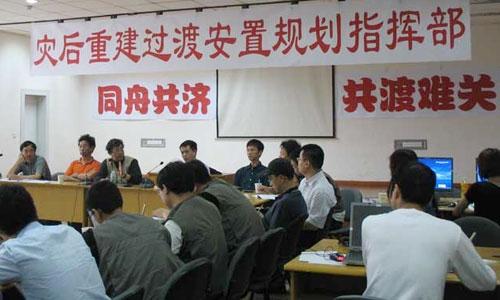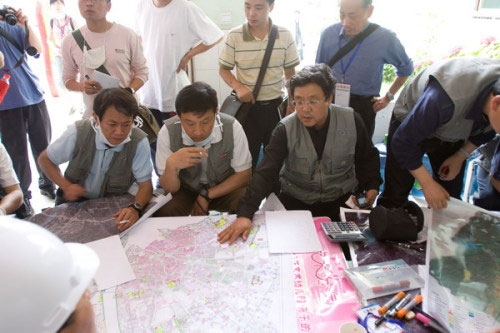| Prof. Wu and Prof. Zhou went to Sichuan Province for post-earthquake reconstruction |
| PublishDate:2008-06-24 Hits:3363 |
 Headquarters of post-quake reconstruction  emergency meeting at Sichuan Province
In the aftermath of the Sichuan Earthquake, Professor Wu Zhiqiang, Dean of the Urban Planning College in Tongji University and Interim Director of WHITR-AP (Shanghai) was dispatched by the Chinese Ministry of Construction Sichuan Province Division to come with all post-haste to the most seriously affected areas-Wenchuan, Beichuan, Doujiang Dam, and other regions. These areas urgently required his expertise regarding plans to first salvage and then rebuild buildings so as to ensure their structural soundness for the future. Professor Wu was also asked to evaluate the damage sustained by the World Heritage sties. Accompanying Professor Wu was fellow Professor Zhou Jian, Director of WHITR-AP and head of a group of experts from the Department of Geotechnical Engineering in Tongji University. Meanwhile the faculty of the Urban Planning College supported the relief efforts in Sichuan.
The Ministry of Construction appointed Professor Wu Zhiqiang as the chief architect of the reconstruction process. Professor Wu in turn volunteered the free services of the Tonji Urban Planning College and the Tongji Architectural Design & Research Institute to post-earthquake reconstruction. He also called for a volunteer group of qualified experts and students to go to the front-line of Sichuan. Meanwhile both he and Professor Zhou have been going back and forth between Shanghai and Sichuan to help to those in needs. |
- Lecture: Preventive Archeology
- New Year Message | UNESCO World Heritage Centre for Training and Research in the Asia and Pacific Region (Shanghai) Extends to You Its Sincere New Year Wishes!
- Review | Cooperation between Xiamen, CNR and WHITR-AP Shanghai
- Review | Yunlong International Workshop on Vernacular Heritage
- Review | The Heritage Educational Landscape Exhibition
- Review | UHC-HEI 1st General Assembly
Copyright © 2009-2012 World Heritage Institute of Training and Research-Asia and Pacific (shanghai)


